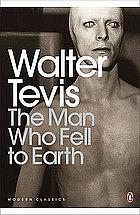Take a photo of a barcode or cover
For me, this is the best book among those, I read this year. I've read it only once yet - this Bloomsbury Edition - and borrowed it from a local library. It was not really hard for me to see the whole story through Newton's eyes. I've read it in English and I'm a non-native speaker of the language. (I don't know about a Hungarian translation but anyway I would have liked to read it in original.)
*"He stared at himself a long time, and then he began to cry. He did not sob, but tears came from his eyes—tears exactly like a human's tears—and slid down his narrow cheeks. He was crying in despair.
Then he spoke aloud, to himself, in English. 'Who are you?' he said. 'And where do you belong?'
His own body stared back at him; but he could not recognize it as his own. It was alien, and frightening."*(pg. 115)
In a setting where humanity is so clearly doomed, Tevis asks what makes us human and whether humanity is worth salvaging. A bleak and saddening read that tackles some big issues without being too dark. Note that I said "saddening" and not "depressing".
Read this if you love sci-fi because of it's capacity to explore big political or social ideas and not a fantasical setting with wild plot elements. On some level, this made me think of Brave New World if it wasn't set in a Brave New World, just a retro-futuristic idea of 80s America, which strays little from 2020s America. Also if you're a Bowie fan like me, you'll find the parallels in Bowie's career and body of work intriguing.
I found it an enjoyable read but it's not one that I'm crazy about. I read this at the right time in my life, where I'm taking an interest in scientific ambition in regards to its sociological consequences. My only real gripe, and perhaps this is a mild spoiler, is that I did not find the implication of hope to be earned. Some authors try too hard to manufacture some semblance of a happy ending.
Man, it feels good to have finished a great book for once.
Then he spoke aloud, to himself, in English. 'Who are you?' he said. 'And where do you belong?'
His own body stared back at him; but he could not recognize it as his own. It was alien, and frightening."*(pg. 115)
In a setting where humanity is so clearly doomed, Tevis asks what makes us human and whether humanity is worth salvaging. A bleak and saddening read that tackles some big issues without being too dark. Note that I said "saddening" and not "depressing".
Read this if you love sci-fi because of it's capacity to explore big political or social ideas and not a fantasical setting with wild plot elements. On some level, this made me think of Brave New World if it wasn't set in a Brave New World, just a retro-futuristic idea of 80s America, which strays little from 2020s America. Also if you're a Bowie fan like me, you'll find the parallels in Bowie's career and body of work intriguing.
I found it an enjoyable read but it's not one that I'm crazy about. I read this at the right time in my life, where I'm taking an interest in scientific ambition in regards to its sociological consequences. My only real gripe, and perhaps this is a mild spoiler, is that I did not find the implication of hope to be earned. Some authors try too hard to manufacture some semblance of a happy ending.
Man, it feels good to have finished a great book for once.
adventurous
reflective
medium-paced
Plot or Character Driven:
A mix
Strong character development:
Yes
Loveable characters:
No
Diverse cast of characters:
Yes
Flaws of characters a main focus:
Yes
adventurous
lighthearted
fast-paced
Plot or Character Driven:
Character
Strong character development:
Complicated
Loveable characters:
Complicated
Diverse cast of characters:
No
Flaws of characters a main focus:
Yes
emotional
reflective
sad
medium-paced
Plot or Character Driven:
Character
Strong character development:
Yes
Loveable characters:
Complicated
Diverse cast of characters:
Complicated
Flaws of characters a main focus:
Complicated
medium-paced
ENGLISH REVIEW
The author of “The Man Who Fell to Earth”, Walter Tevis, once claimed that this novel was the most autobiographical of all his works. At first glance, this assertion appears absurd – how can a book about an extraterrestrial visitor who arrives on earth to save his planet be autobiographical? However, upon reading the book and learning a bit about Tevis’ life, his statement starts to make sense.
The novel follows the story of Thomas Newton, an alien who lands in Kentucky with a pocketful of gold rings and a head full of ideas to make millions of dollars on Earth to save his dying planet. Scientist Nathan Bryce becomes suspicious of Newton and sets out to determine whether he is truly an extraterrestrial visitor or simply from Connecticut. Despite its brevity, “The Man Who Fell to Earth” touches on several themes that readers are sure to pick up on, such as alienation, environmental issues, the misuse of knowledge, and the story of a genius who has failed in his mission on Earth. These themes made the novel a classic, even though it didn’t achieve this status as quickly as Tevis’ other famous work, “The Hustler”.
While the style and tone of “The Man Who Fell to Earth” are more subdued than those of “The Hustler”, they suit the character of Thomas Newton perfectly. Tevis’ writing is exquisite and there are many passages in the novel that demonstrate his talent. Despite the popularity of the 1976 film adaptation of the book, it is in the reading of Tevis’ words that one can truly appreciate the nuances of his art and understand why his books have become classics.
SPANISH REVIEW
El autor de «El Hombre que Cayó a la Tierra», Walter Tevis, afirmó una vez que esta novela era la más autobiográfica de todas sus obras. A primera vista, esta afirmación parece absurda: ¿cómo puede un libro sobre un visitante extraterrestre que llega a la Tierra para salvar su planeta ser autobiográfico? Sin embargo, al leer el libro y conocer un poco sobre la vida de Tevis, su declaración comienza a tener sentido.
La novela sigue la historia de Thomas Newton, un extraterrestre que aterriza en Kentucky con un puñado de anillos de oro y la cabeza llena de ideas para ganar millones de dólares en la Tierra y salvar a su planeta moribundo. El científico Nathan Bryce sospecha de Newton y se propone determinar si es realmente un visitante extraterrestre o simplemente proviene de Connecticut. A pesar de su brevedad, «El Hombre que Cayó a la Tierra» aborda varios temas que los lectores sin duda captarán, como la alienación, los problemas ambientales, el mal uso del conocimiento y la historia de un genio que ha fracasado en su misión en la Tierra. Estos temas convirtieron la novela en un clásico, aunque no alcanzó este estatus tan rápidamente como la otra obra famosa de Tevis, «El Buscavidas».
Si bien el estilo y el tono de «El Hombre que Cayó a la Tierra» son más sobrios que los de «El Buscavidas», se adaptan perfectamente al personaje de Thomas Newton. La escritura de Tevis es exquisita y hay muchas pasajes en la novela que demuestran su talento. A pesar de la popularidad de la adaptación cinematográfica de 1976 del libro, es al leer las palabras de Tevis donde se puede apreciar realmente los matices de su arte y comprender por qué sus libros se han convertido en clásicos.
adventurous
challenging
dark
emotional
funny
hopeful
informative
inspiring
lighthearted
mysterious
reflective
relaxing
sad
tense
fast-paced
Plot or Character Driven:
Plot
Strong character development:
Complicated
Loveable characters:
Yes
Diverse cast of characters:
Complicated
Flaws of characters a main focus:
Yes
reflective
sad
slow-paced
Plot or Character Driven:
Plot
Strong character development:
Yes
Loveable characters:
Complicated
Diverse cast of characters:
Complicated
Flaws of characters a main focus:
Complicated
challenging
mysterious
sad
medium-paced
Plot or Character Driven:
Character
Strong character development:
Complicated
Loveable characters:
Complicated
Diverse cast of characters:
No
Flaws of characters a main focus:
Yes
adventurous
dark
mysterious
slow-paced
Plot or Character Driven:
A mix
Strong character development:
Complicated
Loveable characters:
No
Diverse cast of characters:
No
Flaws of characters a main focus:
Yes
I was gripped from very early on. Not a typical science-fiction book at all, its style is more episodic than plot-heavy, and your sympathies change back and forth as you realise, of course, that the ultimate antagonists are humanity and our need for bureaucracy. The ending is chilling.
Moderate: Medical content


